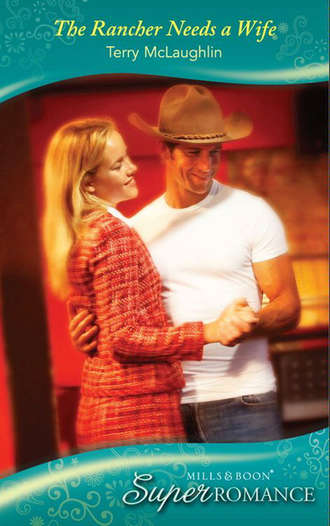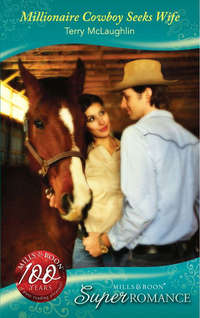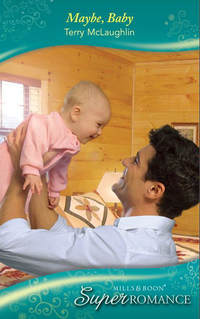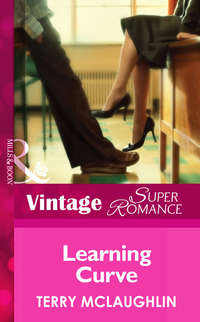
Полная версия
The Rancher Needs A Wife
He shoved his hands into his pockets and cocked one hip against the truck door in a casual pose. “If you’re looking for a fight, Maggie, you’re going to have to look somewhere else.”
She flashed him one of her sweetest smiles. “Now, why would I want to pick a fight with one of the very people I need to convince that my proposal is the right choice for Tucker High?”
“I don’t know,” he said in a maddeningly reasonable tone.
He stood there, as solid and steady as ever, waiting with the kind of long-suffering patience that always seemed to ratchet up her frustration level, and she fought back the temptation to stalk away. She reminded herself that she needed his goodwill if her plan was going to succeed, and that she’d have to learn to deal with his special brand of stubborn passivity.
He’d lowered his head until his hat brim hid most of his face, but she could still see the slow curve of his lips.
“What are you grinning at?” she asked.
“I can nearly hear the wheels spinning in that clever head of yours,” he said. “Figuring all the angles, all at the same time. Probably looking to find the weakest link on the board and work on it until it snaps.”
“Is that what you think I’m doing? Working on you?”
His grin disappeared and his chin came up, the merest fraction of an inch, enough for her to see the faint glint of his eyes beneath the Stetson’s brim. Shadow and light slid over his features, highlighting the rugged arrangement of skin and bone. He’d been a good-looking boy. And he’d grown to be an extremely attractive man.
A strong man, a man who had refused to follow his mother’s desertion, who had dug in and struggled through his alcoholic father’s abusive decline and early death. A man who had battled to hold on to his family’s ruined ranch and then slaved to rebuild it. A man who would never be a weak link by any stretch of the imagination.
“I’d like to see you try,” he said in his deep, quiet voice.
“I’ll bet you would,” she answered.
“Could be interesting.”
“Could be at that.”
Something hovered and snapped in the cold space between them, something that had nothing to do with the echoing past or the current situation. And then his hat brim lowered like a blind to shut her out, and her tension floated away on a tiny cloud puff of a sigh.
“Guthrie did a lot of working of his own on that proposal of his,” said Wayne. “Talked up his idea with a lot of folks around here. Hammered out a kind of informal agreement on how things should be.”
“He never considered any possibility other than something connected to sports.”
“I s’pose there’s a bit of truth to what you’re suggesting. Guthrie’s mighty proud of those big boys of his. And he’s got another one coming along that promises to be every bit as big and fast and tough.” He settled back more comfortably and crossed his feet at the ankles. “And maybe nothing else came to mind because sports is something most everyone in town can relate to.”
“Maybe that’s because there’s nothing else to do.”
“Maybe so. It’s hard to find a variety of things to do when there aren’t more than a few thousand people in this and the next three counties put together. And most of them are busy with making a living off the land.” His shoulders lifted in a shrug. “And maybe sports are what most folks like to watch. And if they don’t, they can talk about how their neighbors’ kids did in the game the night before.”
“There’s more to life than ball games.”
“That’s right,” he said. “There’s rodeo.”
She folded her arms and glared at him. “You obviously agree with Guthrie.”
“I do?”
“And because you do,” she said, brushing aside his question, “why did you vote the way you did?”
“Maybe I don’t like to be rushed into things.”
“All right, then.” She straightened and shoved stray bangs out of her eyes. “That’s something, anyway. Something I can work with.”
“If you say so.” The muscles of his jaw rippled along one side and then the other. “I’m not sure I like the idea of being the object of one of your campaigns, but I guess it comes with the territory.”
“It won’t hurt,” she said with a smile. “Not much, anyway.”
A silence fell between them, the pale wisps of their breath mingling and dissipating in the moonlit air. He straightened away from the truck, and his dark eyes gleamed down at her. “What exactly is it you want from me, Maggie?”
“I want your promise to consider my proposal with an open mind.”
“I’ll consider that proposal of yours, if you’ll consider the possibility that my mind was open to it in the first place.”
She squelched the urge to argue his last point, deciding it would be better to let it go and close the deal. “All right,” she said, extending her right hand. “I will.”
He pulled his hands from his pockets and slid one of them against her palm. It was wide and warm and rough with calluses.
His long fingers slowly closed around hers. “That’s something, anyway,” he said. “Guess I’ll find out whether or not it’s something I can work with.”
“TEAM CAPTAIN and two-time All-County quarterback, Wayne Hammond!”
The dull roar of the homecoming crowd in the stands drowned out the electronic echo of the voice blaring from the speakers, and he throttled back the fear so his feet could move. He aimed for the straggly group of his senior class teammates arranged around the fifty-yard line and started across the field.
The jounce of the padding, the salty stink of his sweat, the hot puffs of breath shredding in the knife-cold night air as his uniform shirt shoved through them—he took it all in, every crystalline sensation, to crowd aside the swelling lump of panic. Trampled grass, slippery mud, the ground so hard beneath cleated feet, jarring his aching knee with every step.
It didn’t hurt, not really, not enough to be taken out of the game. He didn’t favor the leg, didn’t show the pain.
Didn’t let them know it hurt.
He used the pain. Focused on it—that’s what he always did. He pulled tight, pulled in, shut out the rest and went through the motions. Shook hands, Jed’s and Grizzle’s and Trace’s. Faced the stands, nodded and raised a hand. Stared into the lights, the icy white glare. Let the lights blind him to what was beyond—the faces, the people.
This was what he’d worked for, and waited for, and dreamed of and dreaded. All those practices, all those hits, all those sweet, sweet moments of release, of the ball taking flight, sailing toward the target on an invisible thread of energy connecting perfect motion with victory. Bones and muscles and imagination and will. Physics, just like the words on the tattered pages of the fat textbook resting in his locker.
He craved the quiet pleasure of that success and all the other victories, craved the dark silence of the room at home as he tucked another paper memento into the box beneath the bed. But it didn’t matter. Not really.
It wasn’t real, not any of it.
This moment wasn’t quiet, this sensation wasn’t pleasure. This was public—whistles and yells, the slap of fleshy palm to palm, the smell of popcorn oil and spilled beer, the staring eyes. Too many eyes, all aimed at him.
“Wayne!” The drink-slurred voice rose above the others. “Wayne!”
The old man. Drunk, as usual. But not too drunk to climb into a truck and get himself out here. He’d have to rush out of the locker room after the game, find a way to get his keys, make sure he didn’t kill himself—or someone else—getting home.
If he made it home tonight.
He pulled back, pulled deeper inside. Stared into the lights, focused on the pain, kept his chin high. He held, held.
It didn’t bother him, it didn’t matter. Not his fault, not his doing. It wasn’t real.
“Wayne!”
Someone laughed. The noise shifted. The crowd, the many-bodied, fickle, vicious thing in the stands, wavered in the dark shadows beneath the lights. A groan, a hush—the mangled-play, bad-call, missed- pass kind of noise.
His focus slipped, and he lost his way in the darkness, and the scene came into view, indistinct, a nimbus of cold, electric-white sparks at the edges. His father stumbled down the stands toward the fence at the edge of the field.
The faces, the stares. Horror, embarrassment, curiosity, pity.
The pity sliced at him, cut away bits and pieces of his resolve.
The panic clawed at him, ripped through him, tried to drag him away from the torture, away from the pain.
He stood and held, chin up. He didn’t move. Couldn’t move.
Couldn’t let them know how much it hurt.
“Wayne!”
“Wayne!” Someone in the crowd echoed his father’s loose-jawed, calflike bellow. “Wayne!” Someone else laughed.
He turned and saw…
No.
It doesn’t matter. It’s not real.
It’s only a dream.
A dream. Only a dream, nothing real. Only a memory. Too long ago to matter.
None of it mattered, not anymore.
Wayne groaned and kicked away the covers, rolling to sprawl on his back in his empty lake of a bed. Boone, his elderly yellow Lab, whined and padded across the floor and lifted his head to fit beneath his master’s waiting hand. Wayne stroked the dog’s fur, finding comfort in the contact with another living being as he lay waiting for the sweat to cool, waiting for the slick, queasy tremors to subside. They always did, after a while.
He stared at the shadows cast across his ceiling. His ceiling, his room, his house. Thick, sturdy lengths of roughhewn pine stretching to the lofty peak above him, dotted with familiar knots. There’s the one that curves like an Egyptian’s painted eye. There’s the one with the crack like a fishhook.
He inhaled deeply, settling, and scratched Boone’s ear the way the old dog liked it. In another moment or two he’d head down to the kitchen to start up the coffee and then climb back up here to shower. It didn’t matter what time it was. He’d begin the day, begin his routine.
He always did, after the dream. The work helped to sweep away the dregs of lingering shame. The dream didn’t matter when he had chores to do.
He rose and moved through the familiar motions, grateful in these predawn moments for the silence and solitude of his big, empty house. He ran his palm along the satiny surface of the long oak handrail to the ground floor and passed through dim rooms of richly grained wood and stacked rock, rooms done up in the tans and greens that reminded him of the forests at the eastern edges of his land.
The loneliness faded into the background for a while on nights like this. It took too much energy to pull in, to pull tight, to shove things back inside the shadows he’d fashioned for himself. He was relieved he didn’t have to hide his midnight pain from anyone else.
He measured coffee and poured water, while the bright lights of his kitchen banished the afterimages of the nightmare. He supposed those moments at the school board table the evening before—that replay of the old panic, when the sweat prickled on his skin and his voice box locked up and refused to move—he supposed it had been a kind of trigger. Most of the time he could control his fear of appearing in a public way. He’d faced it down, often enough, dragging himself behind any number of microphones, forcing himself to take on the presidency of the Cattlemen’s Association and settle into his supervisor’s seat at the county courthouse.
But when the shower spray hit him, hard and hot, the last bit of his dream came back to pummel him like the water. That last moment, before he’d struggled to full consciousness—that last moment had been a new torture, something he’d never before experienced.
Maybe he’d never dreamed that part because it hadn’t happened. Maybe he’d invented it—maybe the panic of the evening before had added some new layer to trick his mind and tease at his self control.
All his calm rationalizing and logical explanations deserted him, sliding and trickling like water down zigzag paths, swirling in a maelstrom as if to disappear down the drain.
It was no dream. It was a memory, something so painful he’d never revisited it.
He’d turned and seen…her.
Maggie Harrison, the most beautiful girl in the senior class. Tall and boyishly slim, cool and self-contained, supremely confident in her brains and her beauty and her close-knit, loving family. She’d held the kind of powerful popularity bestowed on those who let the world know they didn’t care whether or not they possessed it. And the fact that she never used it carelessly only increased its gravitational pull on her captivated friends.
He, too, had been caught helplessly in her orbit, too attracted to ignore her but too pulled back within himself, too locked away inside his problems to match the ease of her manner or respond to the effortless flash of her smile.
Even in those rare and precious times her smile had been aimed in his direction.
He tipped his head beneath the water and closed his eyes as it ran down his face like tears, remembering now in agonizing detail how she’d stood to one side of the game field, moments before accepting the home-coming queen crown, dressed in her sapphire-blue gown, leveling her sapphire-blue eyes on his. There’d been no pity or disgust in her expression—none of that for Maggie Harrison.
Maggie Harrison Sinclair. She’d always been out of his league, beyond the limits of his possibilities.
Unlike Ellie, the girl Maggie’s mother had taken in a few years before. Wayne had always suspected he shared a secret, silent kinship with Ellie. They’d been two lost souls longing for family and tied to the land. While he’d labored to rebuild the ranch his father had left in ruins, he’d dreamed of the day he’d call on her and invite her for a ride, to head out toward the aching beauty of the mountains and discuss…something. Possibilities of some kind or other.
He hadn’t known how to talk to a girl, how to make that first move toward a first date. He’d never figured he’d had a good opportunity, not with schoolwork and ranch chores and sports schedules eating up his time, not with his father sick or staggering around or passed out on some convenient horizontal surface. He’d never believed he had the right, not with the family finances edging near disaster and the future looking like a mighty flimsy enterprise. He wasn’t even sure he wanted to make a future with Ellie. But he figured he’d better start somewhere, or he’d end up alone.
But then old Ben Harrison had fallen ill, and his prodigal son Tom had come back to help out. Tom had taken one look at Ellie—all grown up, confident and capable—and he’d won the race for Ellie’s hand in marriage before Wayne had had a chance to stumble out of the starting block.
Suddenly restless, Wayne dressed and prowled through the silent house, past shapes graying in the dawn, rooms waiting for family and spaces wanting womanly touches. His ex-wife hadn’t cared about putting her own mark on this place. Maybe that was a good thing, since her personal style had never meshed with his. He knew his friends had been surprised when he’d proposed. They’d warned him that Alicia didn’t seem the type of woman to put down roots or to consider her man before herself.
But they didn’t understand his gnawing need for someone to move through the spaces of this house with him, someone to share a meal at his table or to visit with at night. Someone to give him the children he wanted, children who’d learn to tend the land beside him and inherit it when he was gone.
Someone who didn’t come from Tucker, someone who didn’t know the hurting, frightened person he was in his dream. Someone who’d see only the man he’d learned to pull from the deep, still, secret center of himself.
Battling back the torment of this waking, yearning dream and the ache of desires that chased him through the sleepless nights, he walked into his office and forced himself into the leather chair behind his desk. Now that his cattle had been brought down from summer’s mountain pastures and spread along the valley, it was time to turn his attention to preparations for hunting season. He tapped a command on his keyboard and waited for the computer file listing the first group of lodge guests to appear on the monitor screen.
And he ignored the loneliness squeezing him in its iron fist.
CHAPTER THREE
MAGGIE FINGER-COMBED her short, layered hair in the Granite Ridge guest cabin Friday morning and then paused, staring beyond her reflection to the log walls and beamed ceiling that had once seemed to press in on her. She gripped the edge of the dresser, remembering last summer’s plunge into failure and anxiety, the dizzying spiral drop that had left her gutted and clumsy with a case of the shakes.
Her first panic attack had sent her scurrying from Chicago. Her second had tempted her to extend her stay in Granite Ridge indefinitely. But Harrisons didn’t cry or crumble. And now her life had purpose again.
No more shakes, not today, not tomorrow, not next week or next month. “I’m back,” she told the Maggie in the mirror.
Behind her, one of her grandmother’s quilts spread across the tarnished brass bed, and a braided wool rug lay over pine plank floors. She smiled at the comforting familiarity and the sense of timeless belonging. The snug place was earthy and warm, and as different from the bedroom in her Chicago condo as it was possible to get while remaining on the same planet.
Her former Chicago condo, that was.
She pulled a cashmere sweater over her silk camisole top, adjusting the neckline to let a bit of lace show in the front vee. The ache of loss seemed duller this morning, and the fingers fastening a string of beads around her neck were steady.
Now she could admit that her rush to sell her share of the furnishings to her soon-to-be ex-husband during the divorce proceedings had been a mistake. At the time, all she’d wanted was to get clear and get out, but she missed her French mantel clock and the wide-mouthed majolica vase, the art deco bronze and the signed Konopacki print. When she’d quit her job and fled the city, she hadn’t known where she’d land. And her things certainly wouldn’t match the decor in this cabin her brother Tom had built for his wife and their baby girl.
A ripple of sorrow caught her by surprise. It seemed she’d done more grieving for her brother in the three months she’d spent here at Granite Ridge than she’d done three years ago, when the pain of his death was fresh and raw.
Her widowed sister-in-law had recovered and remarried, and her niece seemed delighted with the development. Even her mother, Jenna, had found herself a new husband. Now it was Maggie who was on her own, who was taking her turn to make a fresh start.
She intended to make the most of it. She believed in making the most of everything.
“Everything,” she said with a nod. “I’m back, and soon I’m going to be back on top.”
She smoothed her slim wool skirt over her hips and stepped into snappy heeled pumps with contrasting oxford-style top-stitching. Dressing as if she were heading to her former position at a private college-preparatory academy gave her the illusion of normalcy, even if she was about to climb into a mud-splattered sports utility vehicle and travel narrow county roads toward her temporary job teaching English classes at Tucker High School.
She collected her leather briefcase, slung a tweed overcoat over one arm and stepped into the knife-edged chill of a Ruby River valley morning. Sticky-fingered yellowed leaves clung to the willows edging Whistle Creek, and the serrated mountain peaks that seemed to hang close above wore a dusting of early snow. Overhead, geese called in their nasal tones, and underfoot the frosted ground crackled beneath her heels.
Memories floated about her like field haze as she bumped along the track leading to the creek bridge. She supposed it was the sharp bend in the gravel road that made her think of her first kiss with that fast-moving preacher’s boy behind the snack stand at the barrel racing tournament. And it must have been the faint scent of alfalfa in the cargo section that brought back the night she’d had one beer too many and let a Sheridan shortstop feel her up in the back of his daddy’s horse van.
Or it could be the eleven-month stretch of sexual deprivation that had her system keyed up over reruns of adolescent experiments in foreplay. Sentiment didn’t usually kick up her pulse rate and warm her from the inside out.
And dwelling in the past wouldn’t solve the problem of her future. There wasn’t a simple or convenient method to fill in the blanks, but she wouldn’t let that fact trigger another episode of shaky self-doubt. The divorce settlement had provided enough money to get her settled in the next place—wherever that might be. In the meantime, she had a roof over her head and time to spend with her family. Time to find a challenging placement, in an academically focused school in a stimulating urban setting.
Time to plot her steps and strategies, to win the battle she’d set in motion at the school board meeting.
She tightened her grip on the steering wheel, ready to transform all her frustrations into motivation and to focus her energies on her goals for the school theater. When she’d accomplished all she intended, sleepy little Tucker High wouldn’t know what had hit it. If there was one thing she knew how to stage, it was a campaign.
Around the last bend in the creek, perched on a knoll above the stumps of cottonwoods charred by last summer’s fire, she glimpsed the tall, white house where she’d spent her childhood. Constructed in the Victorian era responsible for its jutting angles and fanciful trim, the house had sheltered Harrisons for one hundred and twenty-five years. She loved its rambling wings and wide porches, the gables and bays, the nooks and crannies that still held her girlhood secrets and dreams.
She parked on the graveled side yard path and climbed the back porch steps, wincing when the screen door slapped the mudroom jamb. The aroma of the coffee kept fresh and waiting on a brightly tiled counter beckoned from her mother’s cheery kitchen. Beyond yellow-checked curtains at the sink window, puffy hydrangeas fading to mauve and the autumn-tinged leaves of hardy lilacs framed a view of freshly painted outbuildings and pasture land rolling on a grassland carpet toward the Tobacco Root mountains.
“Morning, Maggie.” Will Winterhawk, the Harrison ranch foreman, entered from the dining room and poured a mug of his own before settling at the oversize kitchen table. It still seemed odd to see him take his place there so casually, though he’d been an unofficial part of the family for over twenty years. Last month he’d made it official with a wedding, and he’d moved his small bundle of clothing and his dozens of boxes of books into Jenna’s lavender-scented bedroom suite at one end of the second-floor hall.
The fact that her mother had received a marriage proposal from a younger man—a certified hunk of a younger man—was deeply satisfying.
“Morning, Will.”
“You’re up early.”
She turned to face him and leaned back against the counter. “You know what they say about the early bird.”








